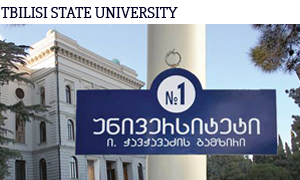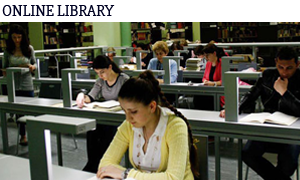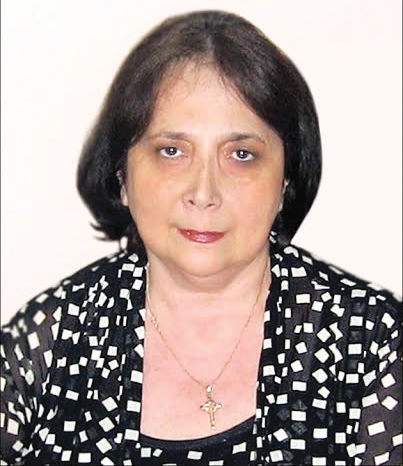
FACULTY OF SOCIAL AND POLITICAL SCIENCES
MATERIALS FROM ILIA CHAVCHAVADZE’S PERSONAL ENCYCLOPAEDIA
According to her, the project aims to present Ilia’s works and activities in all their glory. Writers’ personal encyclopaedias are vital for integrating their work into a valuable collection, making their achievements immortal and to preserve a country’s cultural heritage. For these reasons famous literary figures’ personal encyclopaedias have been published, for example those of Dante, Shakespeare, Burns, Dickens, Goethe, Schiller, Pushkin, Lermontov and others. Such works are welcomed worldwide. We do not have many similar literary works in our culture (the only one, the Ivane Javakhishvili Encyclopaedic Dictionary, was published in 2002).
According to Tsereteli, Ilia Chavchava-dze was the first writer whose personal encyclopaedia was drafted in Georgia, as early as the 1980s, at the initiative of the poet, Irakli Abashidze. A considerable amount of work was done at that time, but the editors had to stop the project because of the socio-political situation. The preparation of the project’s new concept became feasible for the Ilia Chavchavadze Research Centre when the research group involved in the project were granted the copyright. The project is being implemented with the blessing of the Catholicos-Patriarch of All Georgia, Ilia II. The Ekvtime Takaishvili Charity Fund provides financial support.
Giorgi Abashidze, PhD in Philology and Research Director at the Ilia Chavchavadze Research Centre is supervising the project. Others have been working on the project for several years, including the Centre’s Director and philologist, Nino Mamardashvili, while senior scholars at the Centre have also contributed significantly with their efforts. These include Leila Sulkhanishvili, Manana Baratashvili, Manana Kipiani, and Tamar Mikadze. Other researchers are Nana Zghuladze, and Zeinab Lomjaria. Unfortunately, two researchers who contributed to this project have passed away – Natela Saghirashvili and Guram Chokhonelidze.
The unique nature of Ilia Chavcha-vadze’s personality is the main focus of the encyclopaedic research. His personal encyclopaedia is not limited to cultural heritage only; the project also aims to present Ilia’s public activities and contributions to society. That is why this personal encyclopaedia is unique in many ways, as it seeks to be all-encompassing – for example presenting Ilia’s contributions to fields such as banking, to his founding of the Society for Georgian Literacy, the Georgian Drama Society, Georgian theatre, Georgian journalism, his contributions through publishing and editing activities, etc. The encyclopaedia will provide insights on society at that time, as well as the political and cultural environment. It will reflect the overwhelmingly dramatic epoch, including the “Assassination of the century”, Ilia Chavchavadze’s tragic death. The terrible “Tsitsamuri Tragedy” of 1907 (Ilia’s assassination at Tsitsamuri) had a profound impact on subsequent political and social processes in Georgia. Tsereteli observed that working on the project meant a need for reassessing the past in many significant ways, especially the complex and interesting epoch from1837 to 1907.
The socio-political and cultural environment and public opinion in 19th century Georgia were essential for Ilia Chavchavadze as a writer, public figure and monumental figure, as reflected in his personal encyclopaedia. This multidimensional past per se contributes to the complexity of the research, which requires studying and confirming many events, facts, dates, persons, place names, etc. Furthermore, the team studied a number of primary resources, archival materials (including family archives), periodicals, the vast documentation of different organizations like the Society of the Promotion of Georgian Literacy, as well as theatrical and ethnographic societies and organizations, and online resources. In order to examine the accuracy of certain documents, data and facts had to be cross-checked. The researchers studied Ilia Chavchavadze’s story volumes, bibliography, anniversary collections, and memoir literature. They were able to spot and correct certainerrors in the bibliographical literature. The scope of the research undertaken covered not only Georgia but the Russian Empire, Europe and the general historical, political, cultural and geographical features of the epoch.

_1903_წლის_მაისი_(დეტალი).jpg)
Pic.: Ilia Chavchavadze among the members of the State Council Pic.: Ilia Chavchavadze in the garden of the Shervashidze familyin Sokhumi
Ilia Chavchavadze’s Personal Encyclopaedia (1837-1907) – The Words was a volume published by Universal Publishing in 2010. It describes the research activities undertaken over the four previous years. A presentation of that volume took place at the Ilia Chavchavadze Research Centre on October 5, 2010. This rudimentary publication was the basis for Ilia’s personal encyclopaedia. This 738-page book lays out the objectives and determination of the project and outlines the scholarly knowledge about the writer’s life, his literary and public activities accumulated up to that date.
One of the most important findings of the research included famous “personalities” or contemporaries of Chavchavadze, and by studying them in detail the researchers could understand their ideologies and party affiliations, which clearly determined the attitude of certain political groups towards Ilia and his ideological supporters. This work demanded the scholars’ greatest efforts, as it comprised far more than just different biographies, but the role of these people in the multidimensional environment where Ilya lived.
Many pages of the book describe the misfortunes of that period and the losses of a number of prominent figures of Georgian society under the thumb of Soviet ideology. These were figures that were part of Ilia’s social and cultural era. Naturally, each person was an asset, a virtue – and for this reason, studying “personalities” revives that controversial past as well as studying the reassessed, real and immensely multifaceted picture of the socio-political situation. This clarified past is the main result of the project.
Throughout the project, it became feasible to conceptualize Ilia’s publications from different angles, in a way that relates more to current reality. Ilia’s works address issues that are widely discussed today, such as the idea of Georgia’s independence, individual and national freedom, human rights, social justice, freedom of the press, civic activities, etc. Mari Tsereteli studied Ilia’s political letters related to problematic global issues. In addition to being very interesting from a literary point of view, they are also vital to understanding the socio-political picture of the epoch and for establishing valid connections between historical and current events. In 2010 these research findings were presented as “Ilia Chavchavadze’s Political Letters for Geostrategic Analysis” by Ms Tsereteli at a conference, Global Transformations and Georgia.
The Words attracted a lot of interest from academic circles; now the completed works of the project and their significance have been received positively by the academic world and the scholars continue to work on the second book, having fully considered all critical remarks and proposals on the first publication. Typical to any encyclopaedic project is the challenging process of searching for resources and working on archive materials and documentation, a process which is still under way. The second volume, Materials from Ilia Chavchavadze’s Personal Encyclopaedia will be completed by the end of 2015. It will cover further findings of the research and include all the amendments to the first publication.
The scholars are also working on another book, Ilia Chavchavadze and Georgian writers, which will reassess the literary works and contributions of 19th century Georgian writers. The book will also present certain writers’ literary heritage from cultural, ideological and social perspectives, which are relevant to Ilia’s works. Apart from famous classics, a number of little-known or unknown writers were studied and analysed in this respect. This book thus aims to present a more complete image of the cultural life of the epoch, considering the socio-cultural and literary environment surrounding Ilia, and most importantly, how this cultural life brought out Ilia Chavchavadze’s personality to its fullest expression.
Georgian readers will soon have the pleasure of reading Materials from Ilia Chavchavadze’s Personal Encyclopaedia, dedicated to the prominent Georgian writer and public figure, and ideologist of the Georgian national liberation movement. The book is being drafted within the framework of a grant project by a group of scholars including Mari Tsereteli, Associate Professor at the TSU Department of Journalism and Mass Communications, PhD in Journalism, who is participating on behalf of Tbilisi State University.




